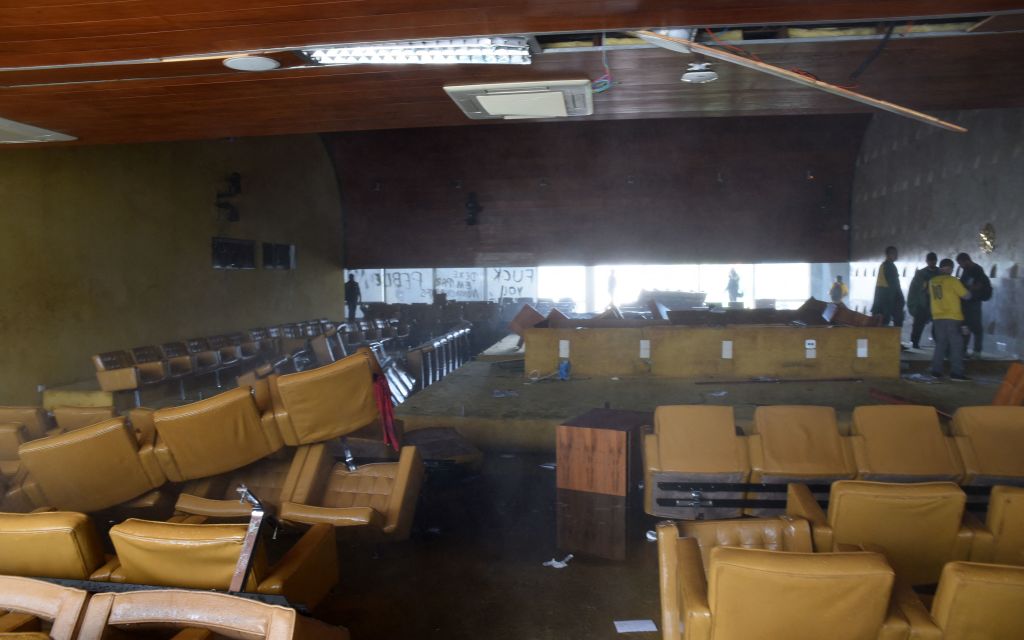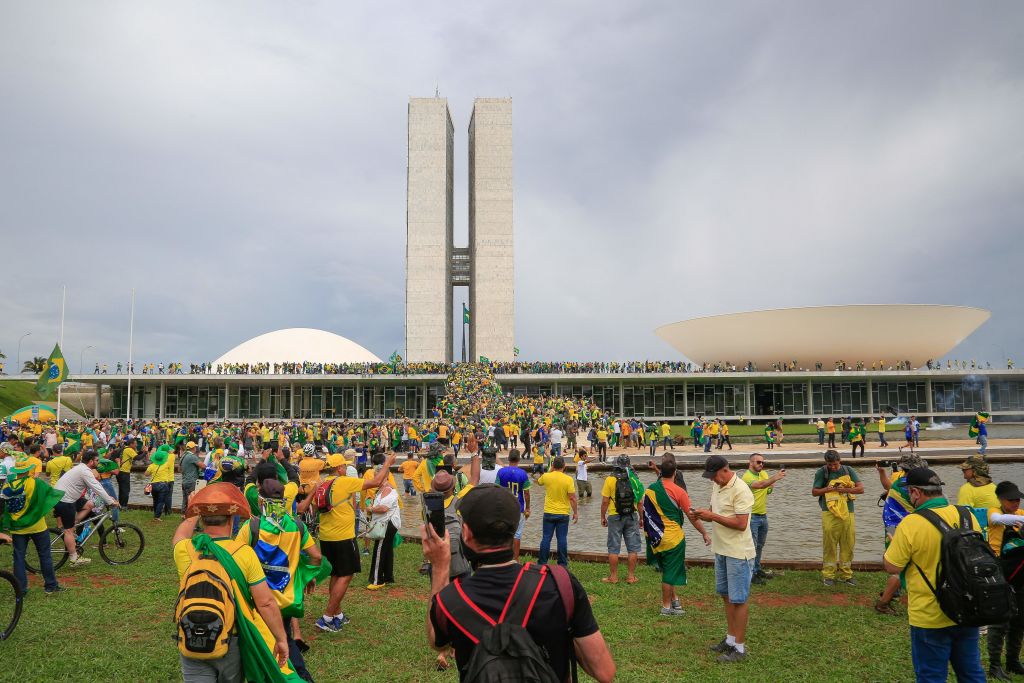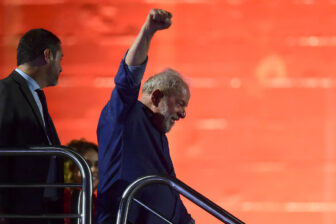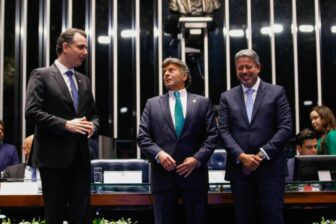On January 8, thousands of supporters of former President Jair Bolsonaro flocked to the center of government in Brazil’s capital and invaded Congress, the Supreme Court and the seat of the presidency, the Planalto palace.
Police forces were able to regain control of the buildings after President Luiz Inácio Lula da Silva decreed federal intervention over the security of the capital. On January 9, the police were still disbanding the crowd camped outside army headquarters since November. There were also reports of protesters blocking refineries across the country.
Congress and the Supreme Court were in recess, and President Lula was visiting a town affected by recent rains, so no officials were present in any of the buildings. But offices were destroyed, and documents and objects were stolen or broken. At least 1,000 people have been arrested, according to local reports.
AQ asked observers to share their reaction to the events in Brasília. We will update this page as developments arise.
Brian Winter, editor in chief at Americas Quarterly
The similarities with January 6 are obvious and have already been widely commented upon, so let’s talk about an important difference.
While the U.S. military was always loyal to the Constitution in 2020-21, the political leanings of the Brazilian armed forces and police are much more ambiguous. No, they did not answer the insurrectionists’ call on Sunday—not even close. But they remain sympathetic to Bolsonaro and the conservative cause, especially among the junior ranks. The possibility of a purge, especially if members of the security forces are found to have aided the rioters behind the scenes, as early reports suggest, could destabilize Brazilian politics in coming months.
So Lula has a delicate challenge in front of him. He must show that law and democracy will prevail in Brazil, and punish the guilty. But he must do so without alienating entire institutions, or describing all of the 49% of Brazilians who voted for Bolsonaro as golpistas. I like Lula’s chances for success on this balancing act—he was firm but calm on Sunday. But in coming weeks there will be calls to prosecute politicians and curtail or regulate political speech on social media, for example.
This was a disaster for Bolsonaro, I think. Given his self-imposed exile in Florida, and relative silence since losing the election, the race to succeed him as the leader of Brazil’s conservative movement will now gain even more momentum. Just as January 6 accelerated Trump’s decline, we are already seeing opposition figures distance themselves from the former president.
Oliver Stuenkel, professor at the Getúlio Vargas Foundation
After numerous analysts had warned, over the past years, of the risks of a “Brazilian January 6” in the aftermath of a Lula victory, the invasion of Brazil’s Congress—along with the Supreme Court and the presidential palace—does not come as a surprise. Perhaps the only unexpected element was the timing: Rather than between the runoff and inauguration, the attack occurred a week after Lula was sworn in as president.
Still, given all the evidence—including a strong presence of bolsonaristas camping in front of the army headquarters since November asking for a coup—the police’s failure to prevent the invasion raises numerous questions about whether the security forces in the capital—overseen by Brasília’s Governor Ibaneis Rocha, a Bolsonaro ally—willfully ignored the risk, or, worse, possibly tacitly supported the vandals. (Rocha was suspended from office for 90 days by the Supreme Court, pending investigation into his responsibility or mission.)
This points to the big difference between the United States’ January 6 and Brazil’s January 8: While President Joe Biden worried little about anti-democratic tendencies in the United States’ armed forces and police, the episode in Brasília shows that Lula may have to prioritize tackling authoritarian sentiment in parts of the security apparatus. Brazil’s democracy stepped back from the cliff last October, but it is not out of the woods. The aftermath of the attacks in Brasília will no doubt occupy significant bandwidth of both the government and the public debate, reducing the time and energy Lula can dedicate to the numerous other pressing issues Brazil faces, particularly in the economic realm.

Thomas Traumann, Brazilian journalist and independent consultant
There is a paradox in the scenes of political terror that unfolded during the invasions of the Brazilian presidency, Congress and Supreme Court this Sunday in Brasília. Visually, they showed thousands of followers of former President Jair Bolsonaro overcoming police barriers, vandalizing offices, breaking windows and destroying classic Brazilian paintings. The tropical version of January 6 in the U.S. was planned to demonstrate the strength of the 49% of Brazilians who didn’t vote for President Lula da Silva in the October elections. However, the terrorist acts in Brasilia may become Lula’s greatest opportunity to expand his power and corner bolsonarismo against a wall.
The bolsonaristas who vandalized the headquarters of the three powers sought to present a show of force against Lula. The protests in Brasília tried to undermine Lula’s governability, but in practice they undermined Bolsonaro’s credibility as an opposition leader. In his first public statement, on Sunday, Lula blamed Bolsonaro for the depredations. “He not only provoked this, not only stimulated it, but is still stimulated by social networks. It is his responsibility, the parties that support him and all this will be determined with great force and very quickly,” Lula said.
No one came out in defense of Bolsonaro. The country’s major political office-holders, including the president of the House of Representatives, Arthur Lira, a Bolsonaro supporter, condemned the acts and supported Lula’s decision to intervene in the Federal District. Today, staying close to Bolsonaro became a liability.
Lula now has a once-in-a-lifetime opportunity to crush radical opposition and achieve the national legitimacy that the bolsonaristas sought to challenge. Moderate opponents, like the governors of São Paulo and Minas Gerais states, tend to tone down their criticism so as not to be confused with the scammers. Right-wing and center-right groups that oppose Lula but are democrats may now be persuaded to adopt a more moderate posture. If Lula uses this opportunity well, he can broaden his alliance in Congress and earn the honeymoon phase typical of a new government, which seemed impossible a week ago.
Cecilia Tornaghi, managing editor at Americas Quarterly
This was a crisis foretold. For days, messages on WhatsApp and Telegram and posts on social media kept sharing “save the date” invites for January 8, recruiting Brazilians to go to Brasilia as well as to convene at eight strategic fuel distributors across the country. The message spelled it out: Let’s bring the nation to a halt. Disrupting fuel distribution in other states doesn’t seem to have worked out, so far. But Brasilia was a different story.
I got an invite myself earlier this week, forwarded over WhatsApp: “Join a free ride to Brasilia this weekend.” But this wasn’t a deep secret shared by a source. Everyone was aware, and about 100 buses did arrive in Brasilia to join the protesters that had been camping outside army headquarters since October 30.
However, reports from Brasilia today showed there was no security preparation of any sort. Those arriving intended to invade public buildings and faced no effective police barriers. Multiple videos showed the opposite in fact: police officers either chatting with the “protesters,” or simply buying refreshments at a street vendor while the buildings that house Brazil’s democratic powers were invaded and defaced.
Eventually, police did take control of the situation, but not before Senate, Supreme Court and Congressional offices and facilities were destroyed.
Whose fault was it? The head of security for the capital was first in line to be deemed responsible, of course. He just happened to have been Bolsonaro’s justice minister. The same official—who was removed from the position while the mayhem was engulfing the Senate, Supreme Court and Congress—happens to be on vacation in Florida. But the problem goes far deeper than that. Security force personnel have been firm supporters of the former president, and easy prey to those who try to convince followers of the odd concept that a coup would save democracy.
It is a hard knot to unravel.







